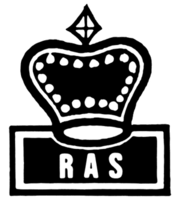Rogers All Stars
Rogers All Stars is a Nigerian independent record label founded in the 1970s by Romanus Nwaementa Okonkwo, also known as Rogers. Its studio and production plant is located in Onitsha. Following Nigeria's oil boom in 1979, Rogers All Stars was one of the labels responsible for the substantial growth of record production in Nigeria, especially for musicians associated with the highlife genre of Nigerian pop music.
| Rogers All Stars | |
|---|---|
 | |
| Founded | 1970s |
| Founder | Romanus Nwaementa Okonkwo |
| Genre | highlife, jùjú, fuji |
| Country of origin | Nigeria |
| Location | Onitsha |
History
Rogers All Stars was founded by Romanus Nwaementa Okonkwo. Okonkwo had previously worked with another Nigerian label, Right Time Records. During this time, Okonkwo would DJ weekend events at local schools with music from Right Time Records artists, as well as other highlife music and American country artists such as Skeeter Davis, Jim Reeves, and The Everly Brothers. Because of the label's use of branded Rogers International audio equipment, he became known as Rogers. After working with Right Time for seven years, he departed to form his own label. In order to avoid conflict with other labels or acts known as "All Stars", he prepended his old nickname.[1]
In 1975, Prince Nico Mbarga signed with Rogers All Stars following his break from EMI, which had ceased production on his previous releases.[2] Two years after EMI rejected a demo of his highlife track "Sweet Mother", Okonkwo heard Mbarga performing the it at the Plaza Hotel in Onitsha with his band, Rocafil; Okonkwo proposed releasing it through his fledgling label. Following the single's successful release, Rogers All Stars sponsored a West African tour for Mbarga and his band. However, tensions emerged when Mbarga brought Okonkwo to court on suspicion that he was withholding royalties.[3] Around this time, Rogers All Stars also signed Cameroonian musician Justin Tchatchoua.[4] By 1979, Nigeria was experiencing an oil boom. This period of economic growth enabled Rogers All Stars and other Nigerian labels to produce millions of records annually.[5]
Due to the popularity of Mbarga's recordings, his style of highlife music became what Black Music & Jazz describes as the "house style" for Rogers All Stars in the late 70s and early 80s. Okukuseku International Band of Ghana, led by Kofi Sammy, used a similar style, blending traditional Ghanaian rhythms and harmonies with two-tracked guitars, which had a more contemporary sound. However, some Rogers All Stars acts, such as Canadoes Super Stars Band Of Ghana, departed from Mbarga's formula, opting instead for a less westernized fuji music style.[6]
In 2017, Okonkwo was involved in a petition to the Copyright Society of Nigeria (COSON) by an assembly of Nigerian music industry professionals. The assembly held COSON accountable for poor copyright regulation in Nigeria.[7] Since the late 90s, poor copyright control has contributed to both declining revenues for independent Nigerian labels and also the movement of major international labels such as EMI and Sony out of the Nigerian market.[8]
Artists
Artists that are or have been signed to Rogers All Stars include:
- Bright Chimezie
- Ikenga Superstars of Africa
- Goddy Ezike & Black Brothers
- Prince Nico Mbarga and Rocafil[2]
- Okukuseku International Band of Ghana[6]
- Canadoes Super Stars Band Of Ghana[6]
References
- Okonkwo, Romanus Nwaementa (14 April 2018). "The Full Story of Rogers All Stars, Father of Musicians" (Interview). Interviewed by Fred Iwenjora. Retrieved 21 August 2018.
- Oti, Sonny (2009). Highlife Music in West Africa: Down Memory Lane. African Books Collective. p. 145. ISBN 978-978-8422-08-2.
- Kent, Sami (26 June 2017). "His Biggest Hit Sold More Copies Than Any of the Beatles'. So Why Haven't You Heard of Him?". Narratively. Retrieved 21 August 2018.
- Llewellyn, Howell (26 July 2008). "Rock the Casbah". Billboard. Nielsen Business Media. p. 22.
- Collins, John (5 June 2015). Fela: Kalakuta Notes. Wesleyan University Press. p. 266. ISBN 978-0-8195-7540-1.
- Black Music & Jazz Review. 6. IPC Specialist & Professional Press. June 1983. p. 3.
- "Concerned Stakeholders In The Music Industry Petition COSON For Straying Away From Objectives". 360nobs. 26 December 2017. Retrieved 21 August 2018.
- Idibia, Innocent (21 March 2019). "Two Decades of Afro-pop In Nigeria: The Perspective Of 2Baba". Nigerian Entertainment Today. Retrieved 17 April 2019.